‘I’ve had a very, very happy life. If they stuck me in a box tomorrow I’d know I’ve had a bloody whale of a time. How many other people have made loads of money and done every drug under the sun, and gone out every night, and been all over the world before they’re 30. A few maybe. I’m one of the lucky few.’
Shane MacGowan
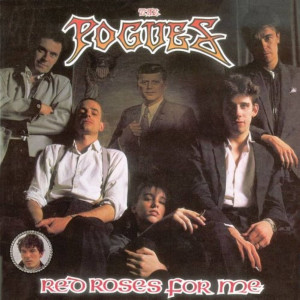 Once upon a time there was a band called The Pogues whose original name was Pogue Mahone, Irish Gaelic for ‘kiss my arse’ before a BBC suit realized what it meant and said that they needed to change their name if the Beeb was to air their material. Pogue Mahone was indeed a good description of this band: their wild and drunken mix of trad material with the energetic kiss-off attitude of punk created a musical style that London and the greater world of rock ‘n’ roll had never seen. Indeed many wished they still hadn’t seen (or heard) it! Cross The Chieftains with the Sex Pistols, or imagine the Horslips with more of a punk feel: the Pogues were unique at the time they made their debut.
Once upon a time there was a band called The Pogues whose original name was Pogue Mahone, Irish Gaelic for ‘kiss my arse’ before a BBC suit realized what it meant and said that they needed to change their name if the Beeb was to air their material. Pogue Mahone was indeed a good description of this band: their wild and drunken mix of trad material with the energetic kiss-off attitude of punk created a musical style that London and the greater world of rock ‘n’ roll had never seen. Indeed many wished they still hadn’t seen (or heard) it! Cross The Chieftains with the Sex Pistols, or imagine the Horslips with more of a punk feel: the Pogues were unique at the time they made their debut.
The Pogues broke up years after front man Shane MacGowan left the group, but that was no matter, as everything they did was bloody fucking brilliant up to and including their post MacGowan work. Just listen to ‘The Band Played Waltzing Matilda’, ‘Fairytale of New York’, ‘Sally MacLennane’, or ‘Wild Cats of Kilkenny’ to see just how brilliant they were. Shane MacGowan and company drunk with a splitting headache were far better than damn near all of the ‘Danny Boy’ style Irish bands. Hell, just check out their version of the Steeleye Span-popularized ‘The Gentlemen Soldier’ to see how they brought a fresh feel to old ballads.”
For a detailed look at the band, read Ann Scanlon’s The Pogues: The Lost Decade. Scanlon has captured the Pogues from their very first days in early ’82 ’til a decade later when they released their only commercially successful album If I Should Fall From Grace With God, an album that really did sound like it was produced instead of being simply tossed together. Ann’s clearly at ease with the band. And it’s clear she had the full cooperation of the band, their friends, and assorted never do well hanger-ons. This is a brilliant work of journalism that catches the evolution of a band as no other book I’ve read has done. Yes, read her book if you’re a fan of the Pogues, but those who should really read it are those interested in how the neverending folk process stays alive. For like it or not, the Pogues did a brilliant job of kicking folk in its ever-so-fat arse and making the lazy old sod get back on its feet! We should all down a pint or three of Guinness to the lads, for we all owe them for their addition to the Irish music genre. And it’s clear to me that Shane MacGowan needed the Pogues as much as 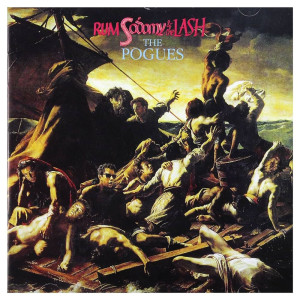 they needed him, as his post-Pogues work never has been as brilliant as his work with the Pogues.
they needed him, as his post-Pogues work never has been as brilliant as his work with the Pogues.
First released was Red Roses for Me, an album that established the style for which the Pogues were infamous. It’s a brilliant mixing of Celtic trad with punk and as is true with other groups such as The Men They Couldn’t Hang a tinge of the American Old West. It was certainly one of the oddest albums ever released into an unsuspecting folk universe. It’s thrash folk at its very best, with mangled lyrics by Shane McGowan and Spider Stacy merging with music best described as Irish-Middle Eastern punk tinged with rock-and-reel. The Pogues’ lineup of MacGowan (vocals/guitar), Jimmy Fearnley (accordion), Jem Finer (banjo), Cait O’Riordan (bass/vocals), Spider Stacy (whistle) and Andy Ranken (drums) was The Pogues’ line-up for this debut album. The lyrics are the usual depressing lyrics the Pogues were known for: see ‘Down in the Ground Where the Dead Men Go’ for a particularly downbeat look at why life sucks.
Next up is Rum, Sodomy & the Lash. Best cuts are ‘The Band Played Waltzing Matilda’, ‘I’m a Man You Don’t Meet Every Day’, and ‘Wild Cats of Kilkenny.’ Produced by Elvis Costello, who would later marry Pogues vocalist Cait O’Riordan, this was a sign that the Nipple Erectors, the previous band fronted by Shane, had imbued the Pogues with their ‘up yours mate!’ spirit. Take ‘The Old Main Drag’ which deals with male homosexuality, police brutality, and drugs intended to chase away the blues. Or ‘I’m A Man That You Don’t Meet Every Day’ which has Cait singing of the richest man in County Kildare a man without a friend after he shoots his only friend, his dog. They finish the album out with ‘The Band Played Waltzing Matilda’, the best version of the Eric Bogle penned anti-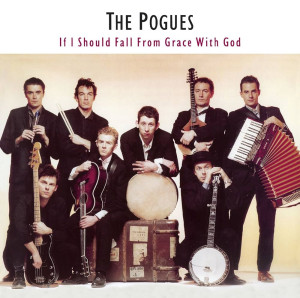 war song you’ll ever hear. And wait ’til you hear their interpretation of the trad song ‘Jesse James’ as it’s both lively and clearly sung!
war song you’ll ever hear. And wait ’til you hear their interpretation of the trad song ‘Jesse James’ as it’s both lively and clearly sung!
If you must buy just one Pogues album, purchase If I Should Fall From Grace With God. Yes, this was the one produced by the ‘suits’ at Island, and is a lot less spontaneous than its predecessor, but it’s nonetheless the work of a band at the peak of creativity and surety of purpose. ‘Turkish Song Of The Damned’, ‘Fiesta’, ‘Streets of Sorrow/Birmingham’, ‘Bottle Of Smoke.’ ‘South Australia’ each has its own style, but is definitely recognizable as the work of the Pogues. Completely a pleasure to listen from the opening strains of ‘If I Should Fall From Grace With God’ to the closing coda of ‘Worms’, this is a bloody great mess of sound and emotion. There are more ghosts, political and just plain damned, than one cares to think about. Great gobs of Middle Eastern instrumentals infuse this album and listen for the banshee screams on many of the cuts. ‘How Come, ‘ ‘Bright Lights’, ‘Living In A World Without Her, ‘and ‘When The Ship Comes In’ are all standout tracks, bound to appeal to any Celtic punk lover. The weirdest thing about this that the Shane MacGowan and Kirsty MacColl duet, ‘Fairytale Of New York’, a song of drunken, bitter realization of failed dreams, was the UK’s #2 Christmas song in 1988!
Peace & Love, their follow-up to what was their most successful outing to 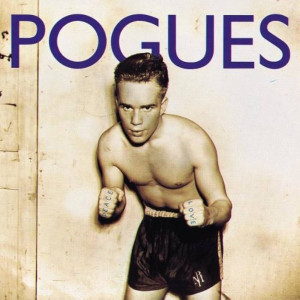 date, was well received by the critics at most outlets with The Boston Globe critic noting ‘More madness, mayhem and magic from England’s finest Irish folk/punk rock band? Sure. And more.’ But their love affair with media came to a halt after If I Should Fall From Grace With God, a predictable outcome given the increasingly downward spiral of Shane’s life. The Rough Guide to Rock notes that:
date, was well received by the critics at most outlets with The Boston Globe critic noting ‘More madness, mayhem and magic from England’s finest Irish folk/punk rock band? Sure. And more.’ But their love affair with media came to a halt after If I Should Fall From Grace With God, a predictable outcome given the increasingly downward spiral of Shane’s life. The Rough Guide to Rock notes that:
The Pogues were never to repeat the success of these two records. Though they were easily filling big venues by now, their shows were revealing the problems that Peace And Love, released in 1989, would make painfully evident. Shane MacGowan’s drinking and, to a lesser extent, drug-taking, were betraying his talent. Peace And Love was not a bad album, but was rarely inspired, and of MacGowan’s six contributions only two – ‘White City’ and ‘Down All The Days’ – came close to his own high standards. His vocal performance, too, was badly affected. The rest of the band tried hard, but not even the accomplished Finer could fill the gap left by MacGowan’s AWOL lifestyle. The Pogues were nearing the end.
To make things worse, the Peace And Love tour was shambolic. MacGowan lurched off stage at regular intervals, usually to return with a refilled glass; he forgot the words he himself had written; he fell over. In the end Spider Stacy had to take over much of the vocal work. Still, MacGowan did get it together enough to release one more album with The Pogues – 1990’s Hell’s Ditch. Surprisingly competent, it represented at 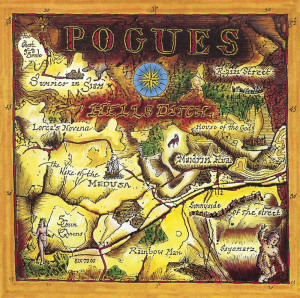 least a partial return to form. ‘Summer In Siam’, in particular, proved one more time and with simple style just how adept The Pogues were at producing the most delicate and moving of ballads.
least a partial return to form. ‘Summer In Siam’, in particular, proved one more time and with simple style just how adept The Pogues were at producing the most delicate and moving of ballads.
I disagree with the assessment that they were nearing the end. Their final three albums, one with the snaggled toothed one himself, and two without him, are all great in their own way.
Hell’s Ditch was produced by the late and much missed Joe Strummer. Shades of both the Clash and The Men They Couldn’t Hang seemed to be haunting this album as can be noted by listening to ‘The Wake of the Medusa’, a song that would fit very nicely on any TMTCH album! This album’s a melange of stylistic approaches which is to say that it’s a typical Pogues album. It worth noting that this was the last Pogues album to feature the singing and songwriting talents of Shane MacGowan, and therefore many hard-core fans consider it to the last true Pogues album. I would like to stress that The Pogues with MacGowan went out on a high note on their last album together. Hell’s Ditch is as strong and full of great playing as any of the band’s previous studio albums. Joe Strummer would replace the now no longer able to function McGowan on the next tour of the band. I have a boot here of their 16th of December 1991 show in Dublin, with Strummer as vocalist. He does such Pogues staples as ‘The Sick Bed Of 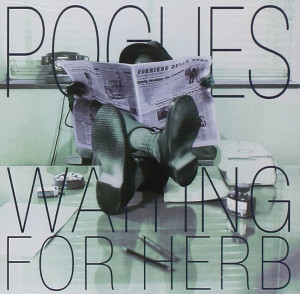 Cuchulainn’ and ‘If I Should Fall From Grace With God’ every bit as well as McGowan did.
Cuchulainn’ and ‘If I Should Fall From Grace With God’ every bit as well as McGowan did.
Hell’s Ditch features a most impressive vocal by Terry Woods on ‘Rainbow Man’ a song I don’t think the old near toothless wonder ever sang. It’s really nice to be to understand the vocals in a Pogues song, too!
But the Rough Guide was wrong as their next album Waiting for Herb was a revelation: there was a really great trad band hiding behind the slurred drunken persona of Shane MacGowan. Don’t buy this album expecting the Pogues of old: this is a quieter, more reflective undertaking. It was a commercial failure, but as the San Jose Mercury News noted: ‘With the folding of the Chameleon label into Elektra, it’s unlikely this hearty Irish folk-rock album will get much promotion. More’s the pity. ‘Waiting for Herb’ bristles with traditionalism and modern punk fervor, with pumping button accordion, bouncy banjos and twangy guitars scoring the Pogues’ raspy, angry-poet refrains’, while the St. Louis Dispatch summed up what most critics felt about this album when they said ‘….Still, Waiting for Herb is a sobering experience for those who have come to expect a Pogues album to be as galvanizing as a shot of whiskey. Without MacGowan, the Pogues sound like a competent, Irish-flavored band covering Clash or Tom Waits material…’
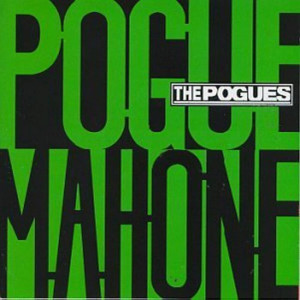 The trick to Waiting for Herb is not to think of it as a Pogues album, but rather as an outstanding Irish rock ‘n’ reel album.
The trick to Waiting for Herb is not to think of it as a Pogues album, but rather as an outstanding Irish rock ‘n’ reel album.
They finally released an album titled Pogue Mahone. It must have been a great delight for the Spider Stacy-fronted band, as I suspect Shane was the intended recipient of this not-so-subtle message. This is the second album that the Pogues put out after MacGowan left, and like its predecessor Waiting for Herb, it’s extremely consistent good music. The title could well be a missive to those who thought that they couldn’t do it without MacGowan. Spider Stacy continues handling most of the vocal duties, and he does a superb job of it. The punk edge that MacGowan brought into the band is gone, but it has been replaced by a stronger folk-rock aesthetic. The emotionally-charged songs are as catchy as ever, but also have a great deal of depth to them.
Do check out my review of the live album Streams of Whiskey, which I think is The Pogues’ best album because it catches the absolute chaos of this band at its bloody best.
Now you should have a feel for this seminal Irish punk folk rock group. If you don’t like my opinions, pogue mahone! If you like it, go play them loud and down a few pints of your favourite stout while doing so!
(WEA, 1984)
(WEA, 1985)
(Island Records, 1988)
(WEA, 1989)
(WEA, 1990)
(WEA, 1993)
(WEA, 1996)
